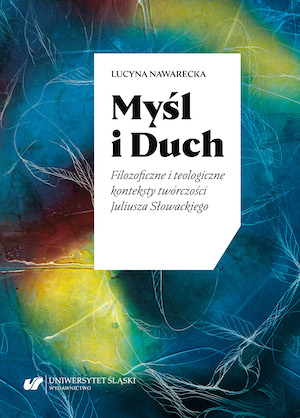Myśl i Duch. Filozoficzne i teologiczne konteksty twórczości Juliusza Słowackiego
Thought and Spirit. Philosophical and Theological Contexts of Juliusz Słowacki’s Oeuvre
Author(s): Lucyna Nawarecka
Subject(s): Language and Literature Studies, Studies of Literature
Published by: Wydawnictwo Uniwersytetu Śląskiego
Keywords: Juliusz Słowacki;philosophy; theology; Fryderyk Nietzsche; emanation;
Summary/Abstract: In her book’s introduction, the author presents the weightiness of thought (rather than just “feeling”) in the Romantic literature, to subsequently discuss selected notions of genesian philosophy hitherto appearing in academic studies on Słowacki’s works. Chapter One touches upon the problematics of human subject present in the poet’s works, in particular the transformation thereof from lowercase “me” into “Me”. Chapter Two pertains to the genesian concept of the world’s origin that appears in the studies as the opposition between emanation and creation. In the chapter devoted to similarities existing between Ralph Waldo Emerson’s philosophy and genesian philosophy, the author attempts to estimate Słowacki’s attitude to creation of the world (whether it was more on the idealistic or realistic side). The chapter that follows is where the author makes her contribution into the discussion relating to the ideological kinship between Słowacki’s and Friedrich Nietzsche’s thoughts, a debate already ignited by the Young Poland movement. She shows that the ostensible similarities are – at the same time – in polar opposition to one another. In the chapter on the idea of the Holy Trinity, the author argues that Słowacki was in fact closer on that matter to the Eastern rather than Western Christian theology. The chapter that follows discusses, inspirational for the poet during his mystical period, the idea of beauty understood as divinisation, whereat the author refers to the concept of Pseudo-Dionysius the Areopagite who considered Beauty to be one of God’s names. What follows from it is that a human being who underwent the divinisation partakes in God’s Beauty. In the chapter on mystical love the author attempts to show the significant role played by love in genesian philosophy. The concluding chapter contains a thesis that inter-religious relations in Słowacki’s mystical dramatic plays eventually assume a form of dialogue despite hostility or even fight between the followers of particular creeds. Summing up her treatise, the author refers to the famous thesis by Martin Heidegger, according to whom “poetry calls for thinking.”
Series: Filozofia
- E-ISBN-13: 978-83-226-3982-5
- Print-ISBN-13: 978-83-226-3981-8
- Page Count: 256
- Publication Year: 2020
- Language: Polish
- eBook-PDF
- Table of Content
- Introduction

